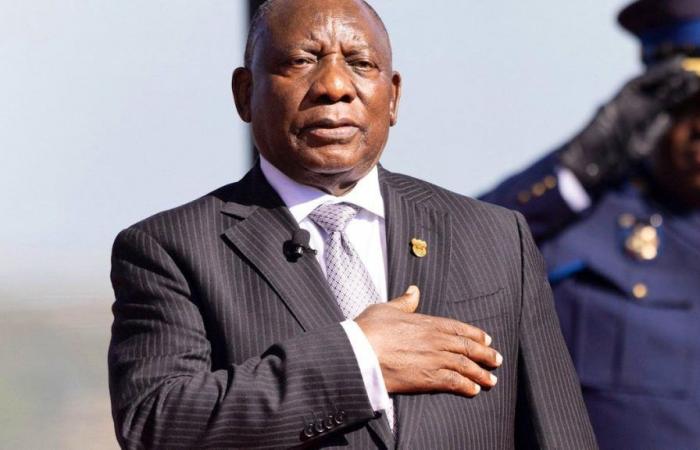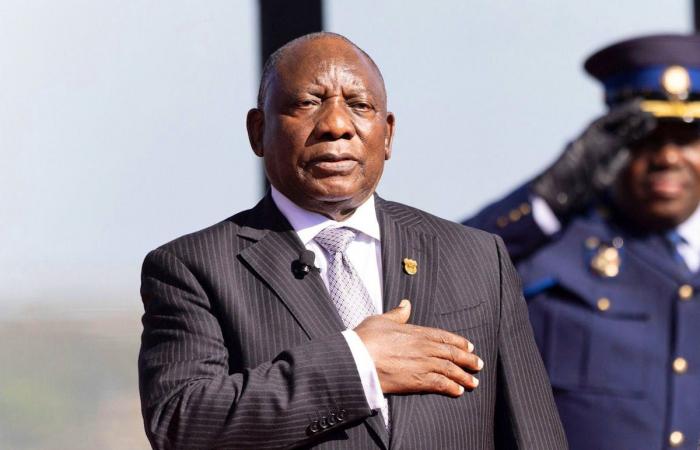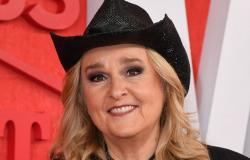Cyril Ramaphosa, as he takes the oath of office before his second term, in Pretoria, June 19, 2024.
AFP
South African President Cyril Ramaphosa announced the composition of the new government on Sunday evening, with the opposition winning twelve ministries after tough negotiations within a coalition that the ANC agreed to after a stinging defeat in the legislative elections.
Out of 32 ministries, the African National Congress (ANC), which has ruled the country since the end of apartheid but lost its absolute majority in Parliament for the first time following elections at the end of May, retains the lion’s share with twenty posts including Finance, Energy, Foreign Affairs, Police and Justice.
The leader of the main opposition Democratic Alliance (DA) party, which advocates economic liberalisation, John Steenhuisen, 48, entered government as Minister of Agriculture. His party holds six portfolios including Environment, Home Affairs and Public Works. The DA also won Education and Communications.
“Unprecedented in history”
“The establishment of a national unity government in its current form is unprecedented in the history of our democracy,” Cyril Ramaphosa said in a televised statement. The 71-year-old head of state was sworn in last week for a second five-year term.
The priority of this new government will be to return “rapid economic growth” to Africa’s leading industrial power and “the creation of a fairer society by tackling poverty, inequality and unemployment,” Cyril Ramaphosa stressed. This government was composed so that “all parties are able to participate meaningfully in the executive,” he continued.
South Africa has only been led by a coalition government once before, during the exceptional circumstances of the democratic transition after the end of apartheid, with Nelson Mandela as president and Frederik de Klerk as deputy president.
“Government alliance”
The unprecedented formation of the new government is the result of the ANC’s bitter debacle in the legislative elections of May 29. Sanctioned at the ballot box in a context of economic decline, endemic unemployment and growing poverty, the historic party won only 40% of the vote at the end of the election, retaining only 159 seats out of 400. The DA won 87 seats (21.8%).
Former President Jacob Zuma’s small party, created only a few months before the election, made a breakthrough by winning 58 seats, ahead of the third political force in the country. The party of the sulphurous 82-year-old leader, declared ineligible and still on trial for corruption, however refused to enter a coalition led by the ANC and does not hold any ministry.
Just like the Economic Freedom Fighters (EFF, 39 MPs), who have vowed to “crush” the government alliance “led by whites”, in reference to the DA which is struggling to shed its reputation as a party in the serving the white minority.
Closed-door negotiations
In recent weeks, intense closed-door negotiations have taken place between the ANC and the DA. At the beginning of the month, after a summit meeting of ANC executives, Cyril Ramaphosa called for the formation of a “government of national unity” and indicated that negotiations were underway with the leaders of the other parties.
But since that announcement, discussions have stalled over the number and nature of ministries that would be granted to the opposition, which was demanding around ten, according to information leaked to the local press. The ANC had denounced “far-fetched and scandalous demands for ministerial posts” and accused the DA, without naming it, of leaking information to the press to achieve its ends.
In all, eleven parties signed an agreement to form a coalition government. Cyril Ramaphosa is due to present the guidelines for his new government at the opening of Parliament on July 18.
(AFP)







